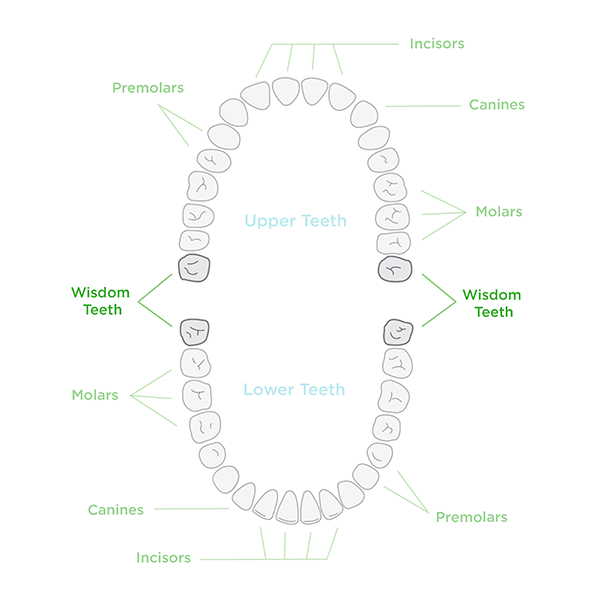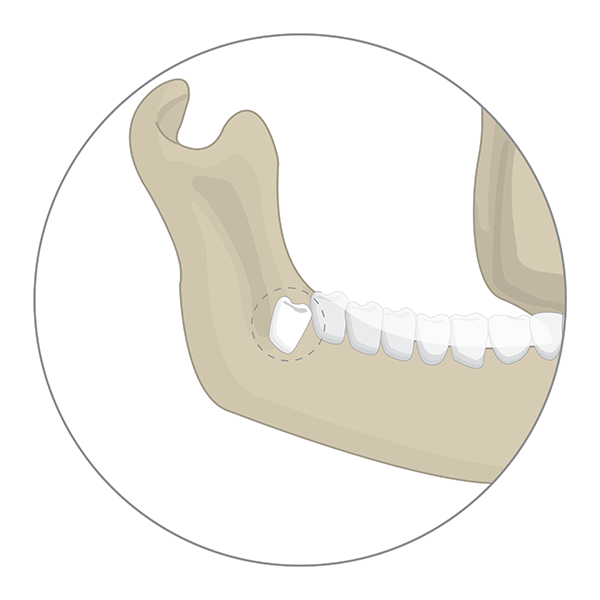In a recent blog post, we spoke about dental offices reopening after pandemic-related restrictions were lifted. If you are high school or college-age or have dependents that age, you may have been told summer would be a good time to get wisdom teeth related issues taken care of. If you need this type of dental care, schedule it as soon as possible. Appointments are filling up quickly in most dental offices.

What are wisdom teeth?
Wisdom teeth are the third set of molars that usually erupt between age 17 and 25. If wisdom teeth are kept clean and healthy when they come in, they can be maintained and helpful for chewing. It’s normal to have some discomfort when wisdom teeth erupt into the mouth. If you have pain and swelling from wisdom teeth coming in, you should seek dental care right away.
When wisdom teeth come in, they can be difficult to maintain because it’s hard to properly brush and use interdental cleaners (floss) at the back of your mouth. If wisdom teeth are not taken care of, decay and gum disease may develop. Gum disease can cause damage to a healthy second molar tooth next to the wisdom tooth.
Teeth that do not erupt fully into the mouth are called impacted. Nine out of 10 people have at least one impacted wisdom tooth. These teeth need to be watched closely as they can get infected, cause periodontal (gum) problems on the teeth next to them and form cysts or tumors. If wisdom teeth are impacted, they must be checked for pathology with regular clinical exams and X-rays. A dentist or oral surgeon can determine if wisdom teeth need to be removed. To avoid the problems that stem from impacted wisdom teeth, it is better to remove them early. Unfortunately, pain-free wisdom teeth are not always disease free.

Wisdom teeth removal
Your dentist may refer you to an oral surgeon for wisdom teeth removals. Please be sure to check with your insurance carrier to see what referrals may be necessary.
Ask your surgeon or dentist about pain control methods during your consultation appointment. Current recommendations from the American Dental Association and American Association of Oral and Maxillofacial Surgeons are to use NSAID’s (ibuprofen, naproxen) and acetaminophen (Tylenol) as first-line medications and reserve the limited use of opioid pain medicine for those situations that require it.
Is it safe to have your wisdom teeth removed during this time? It is! Your dental or oral surgery clinic has received recommendations and guidelines from the CDC (Center for Disease Control and Prevention) to keep patients safe. Dental and oral surgery clinics have many years of experience (and success) protecting the public.
Fun Fact:
Wisdom teeth do not make you wise…
They happen to erupt into the mouth when people think they have wisdom. We promise having them removed will not decrease your wisdom. 😂
This information in this post is for general educational purposes only and does not warrant or represent any information as related to health as specifically appropriate for you. It is not intended to be medical advice or replace the relationship that you have with your health care providers. You should always seek medical advice on any diagnosis or treatment from a qualified health care provider. The information is provided “as is” without any representations or warranties, express or implied.
Subscribe now
Your address and personal information will be safely stored in our database. We do not share or sell this information with anyone. You can unsubscribe to this subscription at any time.






